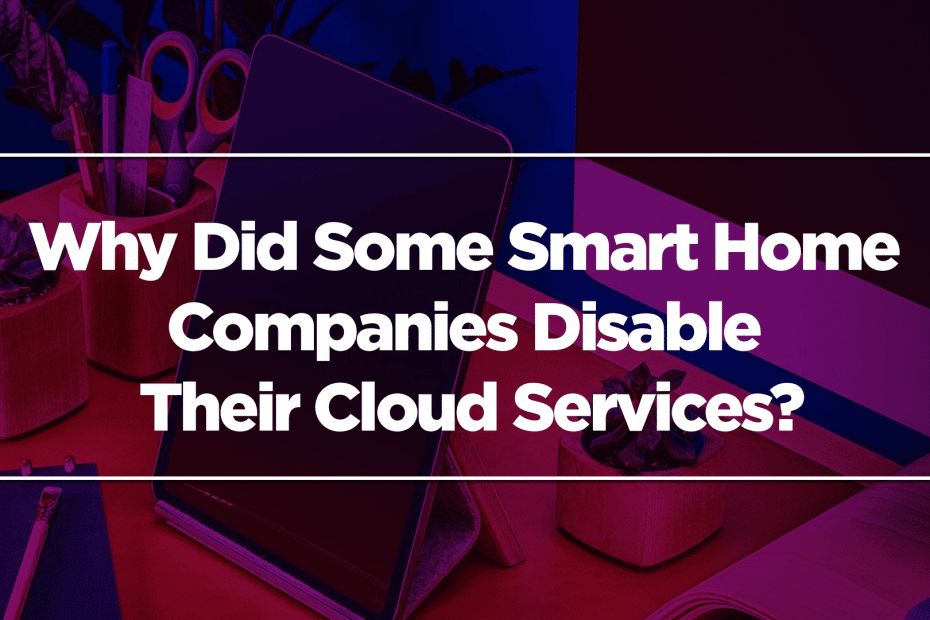Smart homes are becoming increasingly common, implying there’s growth in this industry. But if that’s the case, why is the graveyard of dead or dying smart home ecosystems getting more and more populated. For instance, Stacey on IoT reported that smart home company Insteon has turned off its cloud servers. Likewise, iHome confirmed to The Verge that it shut down its cloud services last April 2.
With all these happening, this may be a good time to reflect on the state of the smart home. Is it over? Does it not have the longevity we expected it to have? Or are these cloud shutdowns necessary for the smart home to move forward?
The two companies mentioned above both rely on a proprietary cloud to deliver a fraction of the experience they promised their customers. There is a major problem with this setup. Almost all companies make changes in their business models. And they may find that the cost of running a cloud is unnecessary. When they reach that conclusion, the poor customers are left with useless pieces of plastic in their homes.

It is not the first time that this has happened. Google has bought and then shut down the Revolv smart hub. Lowes did the same with Iris, and Best Buy did it with Insignia. Then, Staples unplugged its Connect Hub while Wink transitioned from a free to a paid service.
This series of events reveals something that many smart home startups and companies overlook. That is the cost of maintaining a cloud-based smart home service. It can cost a lot, for a long time.
What does it entail?
Admittedly, most of these examples are from way back. But the cloud carnage has begun again in the last few weeks. iHome’s shutdown effectively ended support for several of its smart plugs, smart monitor, motion sensor, leak sensor, and door window sensor.
These devices are compatible with HomeKit. Therefore, they will still work with the Apple Home app. If your smart home does not revolve around the Apple Home app, these smart plugs and monitors are essentially junk.
Please be aware that there are still sellers of these smart home devices. Those devices will no longer work because they require the iHome app, which no longer exists.
Insteon’s Unannounced Shutdown
Last April, one event surprised Insteon users. They started reporting that the hubs that control their Insteon devices were offline.
This smart home ecosystem that relies on a proprietary communication protocol has been in business since 2005. In fact, it is one of the earliest smart home pioneers. So it really confused many people when it went completely dark.
Insteon did not release any official statement ahead of the shutdown. And unlike iHome, which sent in-app notifications, it did not give any early warnings to its users. For a time, the Insteon system status cheerily announced that all services were online – though that was not really the case. The only official response from Insteon was the message to the Insteon community that it posted on its website.
However, the cryptic message only talked about the company’s financial troubles. It did not address what’s happening with its services and what its customers can do.

Thankfully, Insteon was originally built as a locally controlled system. So, if you own Insteon devices, you can switch them and their hubs to an open-sourced home automation system. Hubitat and Home Assistant are prime examples of what you can use.
That said, despite the inconvenience of the surprise shutdown, Insteon users are still luckier than iHome users.
The Proprietary Cloud is The Weak Link
Yes, a cloud-connected device has so many benefits. They offer away-from-home control, over-the-air updates, and easier setup and programming. Nonetheless, the proprietary cloud is still the weakest link in the system. Its instability is its greatest flaw.
The major downside is the end-users are basically leaving their fate to the companies that sell the devices. If the company decides to stop running the servers, the end-users cannot do anything.
That property of smart home tech deters many people from building one. Why would they want to buy expensive devices that may become as useless as a screen door on a submarine? The Revolv hub that cost $300 paints a picture. They no longer serve any purpose. Sadly, many Insteon users paid more than that for their systems.
The Solution
Because of the instability mentioned above, some people fear smart homes. That’s too bad because smart homes can really make one’s life easier and more comfortable.
The solution is not to abandon smart homes but make them the norm. For the industry to accomplish that, smart devices must have a unified system to connect them. This system must not be dependent on the fortunes of individual companies. Therefore, even if one closes shop, their devices will still work as if nothing happened.
That is what Matter – said to be the upcoming new industry standard – is promising. Big and small companies support this new smart home interoperability protocol. It will allow devices to work locally in your home without relying on a single cloud service to operate.
That does not mean that they would not work with the cloud. They still can, but it would not be necessary for the devices to function.
Furthermore, if you want the benefits of cloud control, you can choose whichever compatible platform. And if one or more ecosystems go away, you can simply choose another way to control your devices. Thus, what happened to Insteon and iHome users will not happen again.

Matter also solves interoperability issues. That allows you to buy smart home devices from any provider without worrying if they will be compatible with the others or not. Matter makes them compatible.
But please note that not all companies chose to include Matter compatibility in their devices. For example, Govee has not yet confirmed if its lights will support Matter or not. So be wary when buying devices from this company and those like it.
